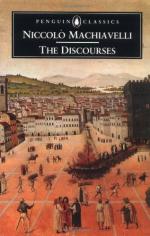
|
| Name: _________________________ | Period: ___________________ |
This test consists of 5 multiple choice questions, 5 short answer questions, and 10 short essay questions.
Multiple Choice Questions
1. What did Machiavelli suggest is the advantage of settling in areas that were "sterile" (barren)?
(a) Barren areas stand at crossroads between fertile areas so they can control trade between prosperous cities.
(b) The poverty of resources would require those living there to have less cause for discord.
(c) The isolation from more fertile areas allow for greater freedom.
(d) Residents of sterile areas become more creative and develop technologies that can be sold to more fertile areas.
2. How does Machiavelli suggest that Princes and other leaders deal with acts that offend their citizens?
(a) Distract the Citizens by making war against a nearby province.
(b) Increase taxes on the wealthy and use the money in ways that benefit the general masses.
(c) Make the offense quickly then act to reassure them and give them cause to quiet and firm their spirits.
(d) Increase their power and penalties for crimes and scare the Citizens into submission and acceptance.
3. What did Machiavelli identify as the cause of conspiracy against a hereditary Princes?
(a) They degenerated from their fathers, and surpassed others in sumptuousness and lasciviousness and in every other kind of delight.
(b) The general population became dissatisfied with the distribution of wealth.
(c) Less powerful people desired the power of the Prince.
(d) The larger population of citizens became unhappy with the the political preferences of the Princes.
4. What are the five types of government identified by Machiavelli?
(a) Tyranny, constitutional, military oligarchy, principality, and democracy.
(b) Republic, fascistic, democracy, principality, and oligarchy.
(c) Democracy, anarchy, monarchy, constitutional, and institutional.
(d) Monarchy, aristocracy, democracy, oligarchy, and anarchy.
5. What was a rival Empire to Rome as Rome began its expansion?
(a) The Babylonians.
(b) The Egyptians.
(c) The Spartans.
(d) The Carthaginians.
Short Answer Questions
1. What is an obvious counterpoint to Machiavelli's assertion to the benefits of the power of the Caesars to the Roman Empire?
2. Why does Machiavelli recommend that those who want to reform a city should retain the appearance of the institutions they want to reform?
3. How long did Sparta peacefully exist without changing its laws, according to Machiavelli?
4. According to Machiavelli, what type of people seek what office to cause a city to become corrupt?
5. What does Machiavelli identify as an important action for Nobles to take to control the ambitions of Citizens seeking position?
Short Essay Questions
1. How does Machiavelli explain that a City grows either through love or through force?
2. Why does Machiavelli consider a Citizen rising to take authority through irregular means (popular uprising) harmful in a Republic?
3. Why does Machiavelli advise that a Prince "temporize" a perceived evil in his State?
4. Why were the Plebe candidates not suited for the open positions of the Tribunes?
5. What examples from history does Machiavelli claim offers guidance to leaders?
6. Why does Machiavelli recommend to leaders of a Republic to keep a shadow of the institutions that are being reformed?
7. In the title of Book 1, Section 8, what does Machiavelli mean with the phrase, "...so much so calumnies are pernicious...?"
8. Why does Machiavelli report that the Roman Senate decided to pay a public stipend to the soldiers in the army?
9. What two methods did Machiavelli identify that Roman Nobility drew honor from the Plebes?
10. Why did Machiavelli praise the Plebes for refusing to choose their peers for Tribunes for which the Nobility allowed Plebes candidacy?
|
This section contains 1,095 words (approx. 4 pages at 300 words per page) |

|




